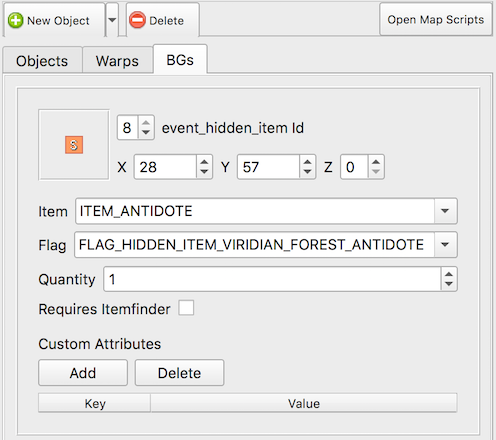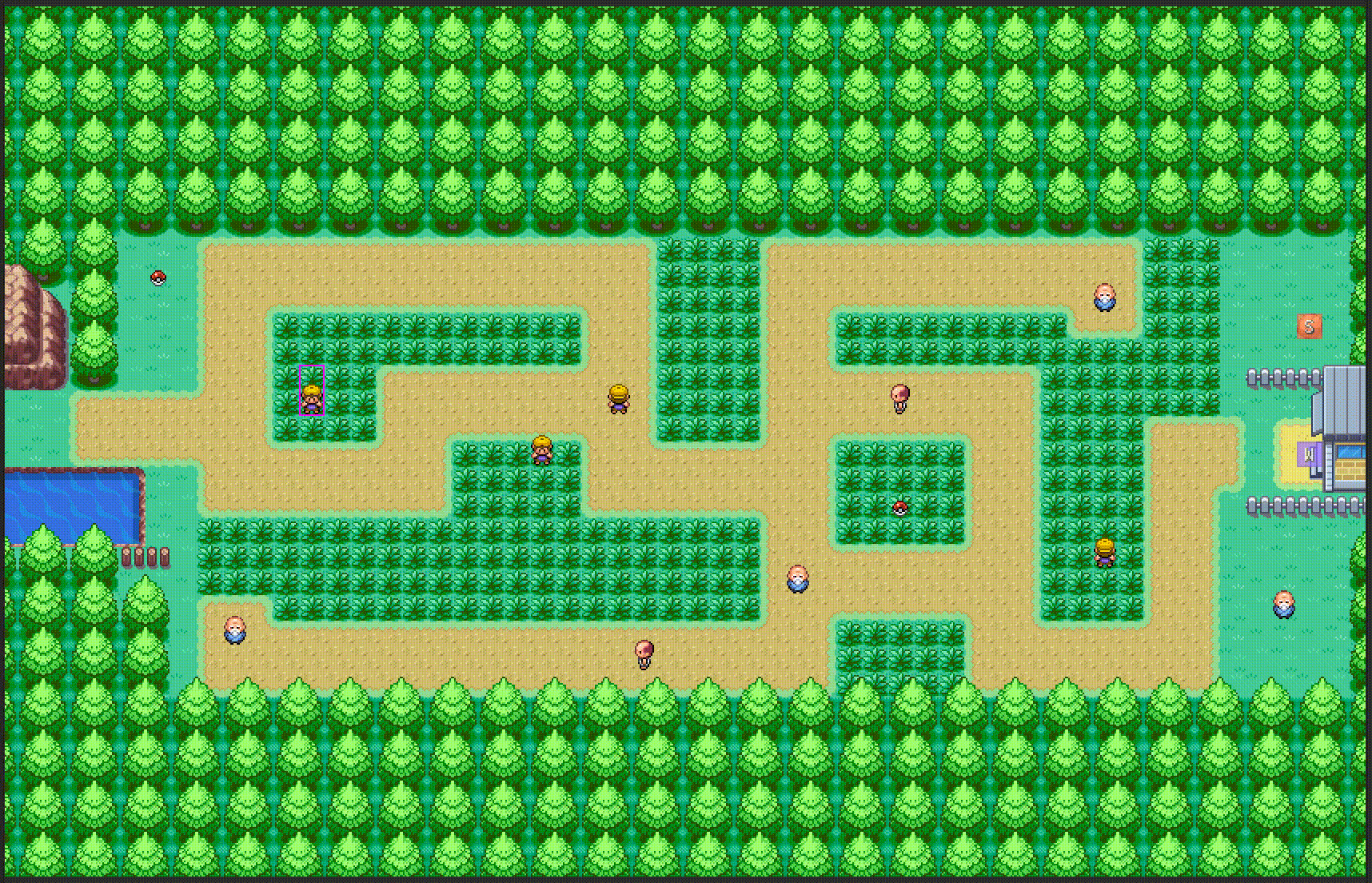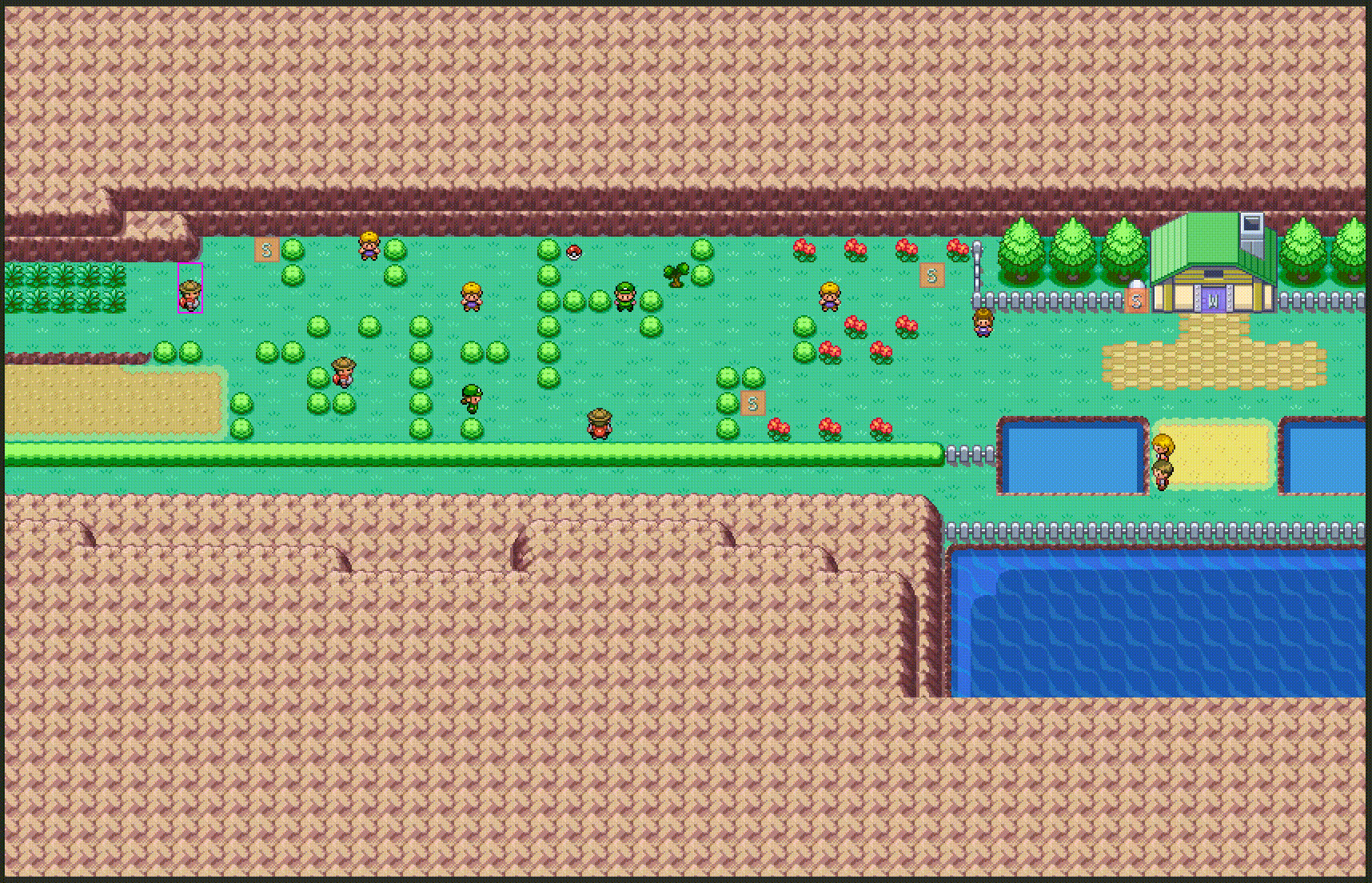Editing Map Events
Events are what bring your maps to life. They include NPCs, signposts, warps, scripts, and more. Open the Events tab above the map area, and let’s dissect what’s going on.

Map Events View
All of the events are visible on the map. The Event Details window on the right displays the properties of the currently-selected event. If you look closely, you’ll see that the woman NPC near the Pokémon Center has a pink border around it because it’s selected. To select a different event, simply click on an event in the map area. Multiple events can be selected at the same time by holding Ctrl (Cmd on macOS) and clicking another event. Alternatively, you can use the spinner at the top of the event properties window to cycle through events.

Event Id Spinner
Warning
There is currently no undo/redo functionality when editing information in the Event Details window! Use Git version control!
Adding & Deleting Events
To add a new event, press the green plus button. You can choose between the different types of events by clicking the small arrow on the right side of the button. You can also duplicate any currently selected events with Ctrl+D.
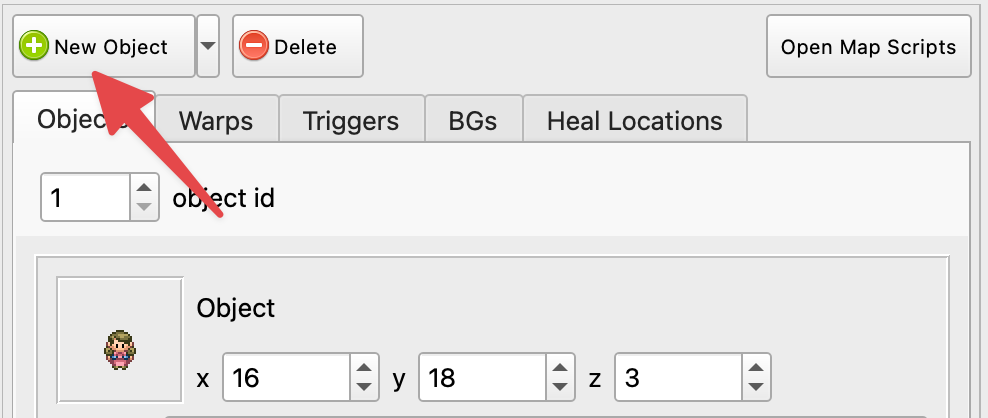
Add Event Button
To delete the selected event, press the  button.
button.
Event Positions
All events have X/Y coordinates. To move an Event, click and drag it to a new position on the map. Alternatively, you can use the X and Y spinners in the event properties.

Event Coordinates Spinners
Events also have an elevation, also known as Z coordinates (see image above). Elevations are explained in detail in the Collision Types section.
Next, we’ll cover each type of event in detail.
Object Events
Object events are typically used for NPCs (non-player-characters). More technically, it’s any event that has a sprite and the ability to move around. Object events are displayed using their assigned sprite, except for special cases. Any object event that uses a dynamic sprite (like berry trees) or that Porymap doesn’t recognize will be displayed as a blue square with an N ![]() .
.
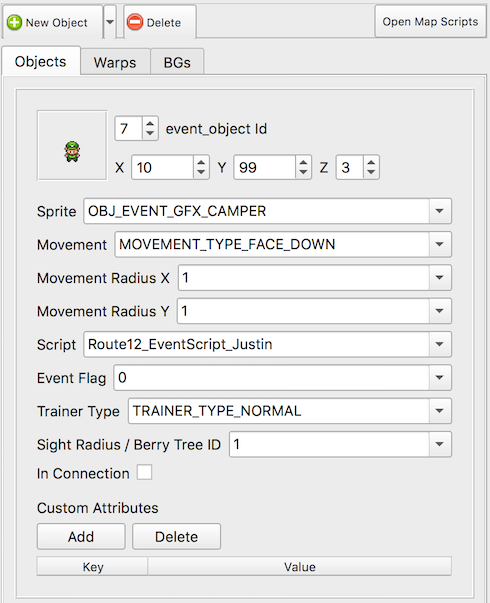
Object Event Properties
- Local ID
This is an optional field. Here you can give a unique name to your event so that you can refer to it elsewhere. If the event has no ID name, you can still refer to it using its number ID instead (the number next to the spinner at the top of the window).
For example, if you give this object event a Local ID name of
LOCALID_MY_NPC, you could write in a scriptapplymovement LOCALID_MY_NPC, MovementScript, orapplymovement 1, MovementScript, and either one would apply to this event. The benefit of usingLOCALID_MY_NPCover1is that if the number changes you won’t have to update your scripts at all!- Sprite
The sprite that is used by the object.
- Movement
The movement type used by the object during normal gameplay.
- Movement Radius X/Y
Movement types that involves walking or moving around the map can be bounded by a radius. The ensures that the object is always within the specified range from its original position.
- Script
The script that executes when the player interacts with the event. The dropdown for this field contains all the scripts from the current map and any scripts already in-use by the map’s events. You can enter the name of any script even if it doesn’t appear in the dropdown.
- Event Flag
The flag value that controls if the object is visible. If the flag is set (equal to 1), then the object will be invisible. If the flag is not set, or
Event Flagis set to0(i.e., no flag), then the object will be visible.- Trainer Type
The trainer type used by the object. If the object is a trainer,
TRAINER_TYPE_NORMALmeans that the trainer will spot the player in the object’s line-of-sight.- Sight Radius or Berry Tree ID
If the object is a trainer, this property control how many spaces away the trainer can see to spot the player for battle. If the object is a berry tree, this specifies the global id of the berry tree. Each berry tree in the game has a unique berry tree id.
Clone Object Events
Clone Object events are a special type of object that inherits its properties from another Object event. They are used in-game to load objects that are visible in the connecting area of adjacent maps. The targeted object to clone is specified by id and map name. If the targeted object does not exist, or it’s also a clone, the sprite for graphics id 0 will be displayed instead. Double-clicking on a Clone Object will open the targeted map with the targeted object selected.
Note
This event type is exclusive to pokefirered projects. If you have modified your pokeemerald/pokeruby project to support this event type, you can enable them under the Events tab of Options > Project Settings....
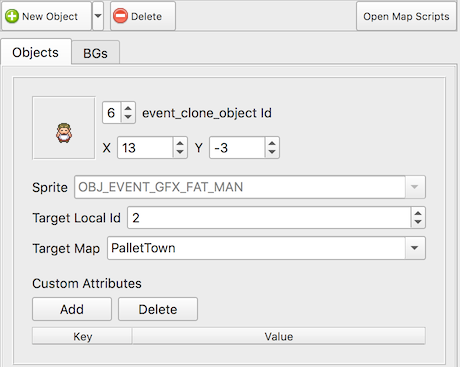
Clone Object Event Properties
- Local ID
This is an optional field. Here you can give a unique name to your event so that you can refer to it elsewhere. If the event has no ID name, you can still refer to it using its number ID instead (the number next to the spinner at the top of the window).
- Sprite
The sprite that is used by the object. Clone Objects inherit their sprite from the targeted object, so this cannot be edited. This field is not actually read by the game.
- Target Local ID
The local id of the object to be cloned.
- Target Map
The name of the map the object to be cloned is on.
Warp Events
Warp events are how the player is able to warp to other maps, such as entering a building. Double-clicking on a warp will automatically open the destination map and select the destination warp. This makes it very easy to navigate around in Porymap. Warps need to be on specific metatiles to function as an exit; a warning will appear if the warp event is not on one of these metatiles.
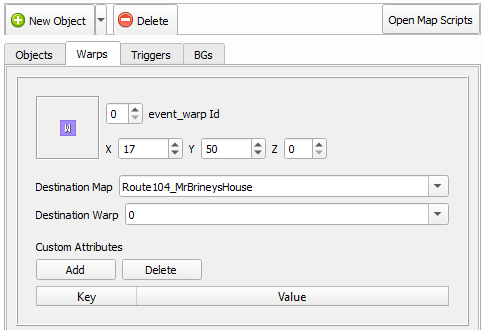
Warp Event Properties
- ID
This is an optional field. Here you can give a unique name to your event so that you can refer to it elsewhere. If the event has no ID name, you can still refer to it using its number ID instead (the number next to the spinner at the top of the window).
This is used when setting the Destination Warp property for another warp.
- Destination Map
The name of the map to travel to.
- Destination Warp
The ID of the warp to travel to.
Trigger Events
Trigger events are scripts that execute when the player walks over them. However, they only execute when a variable is equal to some value. Typically, they execute once, set the variable’s value to something else, and then never execute again because the variable’s value no longer matches.
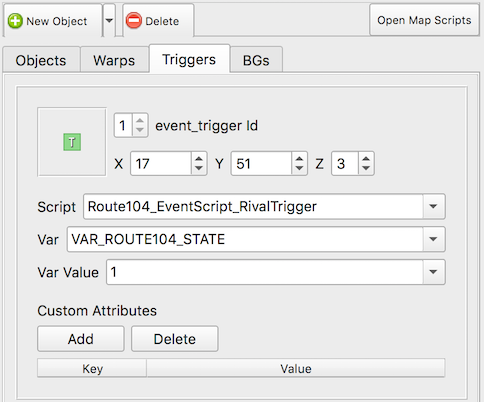
Trigger Event Properties
- Script
The script that executes when the player walks over the trigger AND when the value of
VarequalsVar Value.- Var
The variable used to determine if the trigger’s Script should execute.
- Var Value
The value that the Var must equal for the trigger’s Script to execute.
Weather Trigger Events
Weather trigger events are a very specific type of trigger. When the player walks over a weather trigger, the overworld’s weather will transition to the specified weather type.
Note
This event type is exclusive to pokeemerald/pokeruby projects. If you have modified your pokefirered project to support this event type, you can enable them under the Events tab of Options > Project Settings....
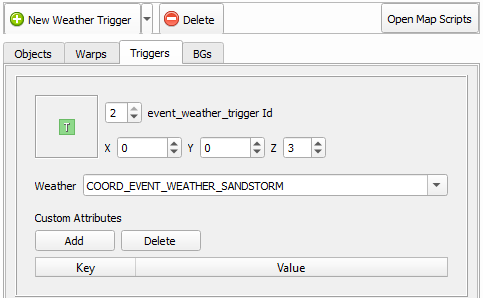
Weather Trigger Event Properties
- Weather
The type of weather to transition to.
Sign Event
Sign events, or signposts, are simple interactable scripts. They are typically used for things like signs in front of buildings. The player’s facing direction can be required to be a certain direction in order to interact with the sign. Signs are the first of three “BG” event types.
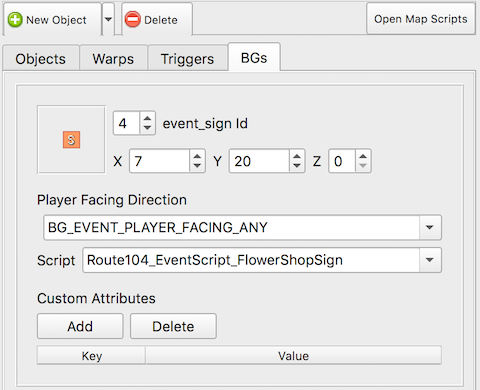
Sign Event Properties
- Player Facing Direction
The direction the player must be facing in order to execute the sign’s script.
- Script
The script that executes when the player interacts with the event. The dropdown for this field contains all the scripts from the current map and any scripts already in-use by the map’s events. You can enter the name of any script even if it doesn’t appear in the dropdown.
Secret Base Event
This is the event used to mark entrances to secret bases. This event will only be functional on certain metatiles. Unfortunately, they are hardcoded into the game’s engine (see sSecretBaseEntranceMetatiles in src/secret_base.c). Double-clicking on a secret base will open the secret base’s map (assuming Porymap is able to infer which map that is by looking at the Secret Base field).
Note
This event type is exclusive to pokeemerald/pokeruby projects. If you have modified your pokefirered project to support this event type, you can enable them under the Events tab of Options > Project Settings....
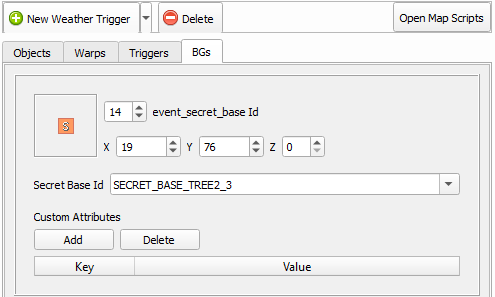
Secret Base Event Properties
- Secret Base
The id of the destination secret base.
Heal Locations
This event is used to control where a player will arrive when they white out or fly to the map. The white out functions a little differently between game versions. For pokeemerald and pokeruby players will arrive at the event’s coordinates after a white out, while in pokefirered they will arrive on the map set in Respawn Map and at hardcoded coordinates (see SetWhiteoutRespawnWarpAndHealerNpc in src/heal_location.c).
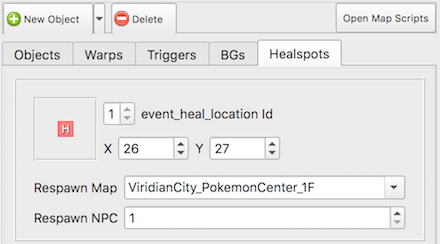
Heal Location Properties
- ID
The unique ID name of this Heal Location Event. This is the name you’ll use to refer to this heal location in scripts (e.g.
setrespawn HEAL_LOCATION_VIRIDIAN_CITY) or elsewhere in your project. Unlike other ID name fields, this name is required and cannot be substituted with the ID number at the top of the window.- Respawn Map
The map where the player will arrive when they white out (e.g. inside the PokéCenter that the heal location is in front of).
Exclusive to pokefirered projects. Can be enabled under the
Eventstab ofOptions > Project Settings....- Respawn NPC
The local id of the NPC the player will interact with when they white out.
Exclusive to pokefirered projects. Can be enabled under the
Eventstab ofOptions > Project Settings....
Custom Attributes
Under each event you’ll also find the Custom Attributes table. This lets you add new data to any event. By default it is empty, and only the Add button is enabled.

When you click Add you will be prompted to enter the name of your new data field, what type of data it is, and the value. Once added you can edit their values in the table, or select an entry and click Delete to remove it.
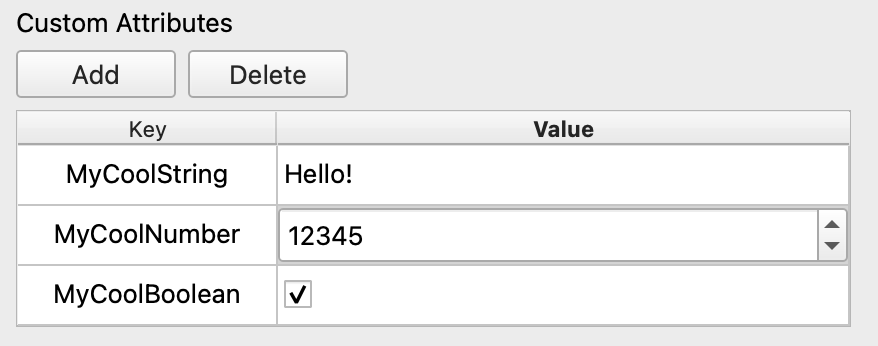
At the moment our new data has no impact on the game, but we can write code in our project to do whatever we want with it! The new data can be found in the map.json file of whatever map it was added to. Normally these map.json files are handled by a tool in your project called mapjson, so to use your new data you may need to modify this tool.
Open Map Scripts
Clicking the  button will open the map’s scripts file in your default text editor. If nothing happens when this button is clicked, you may need to associate a text editor with the
button will open the map’s scripts file in your default text editor. If nothing happens when this button is clicked, you may need to associate a text editor with the .inc file extension (or .pory if you’re using Porycript).
Additionally, if you specify a Goto Line Command in Preferences... then a tool-button will appear next to the Script combo-box in the Events tab. Clicking this button will open the file that contains the script directly to the line number of that script. If the script cannot be found in the project then the current map’s scripts file is opened.

Ruler Tool
The Ruler Tool provides a convenient way to measure distance on the map. This is particularly useful for scripting object movement. With the Pointer Tool selected you can activate the ruler with a Right-click. With the ruler active you can move the mouse around to extend the ruler. The ruler can be deactivated with another Right-click, or locked in place with a Left-click (Left-click again to unlock the ruler).
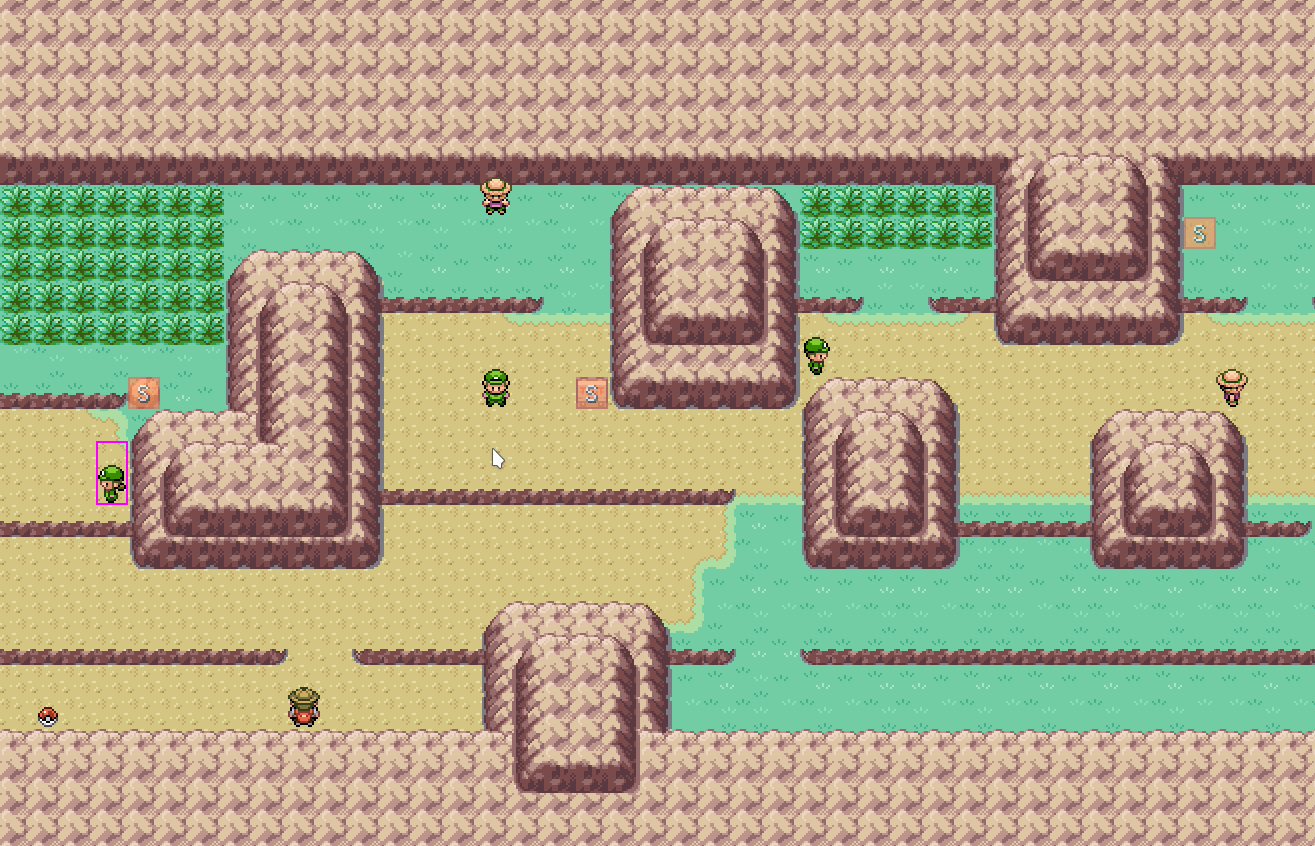
Measuring metatile distance with the Ruler Tool
Tip
If you’d like to see your events while editing the map, select View > Show Events in Map View.
